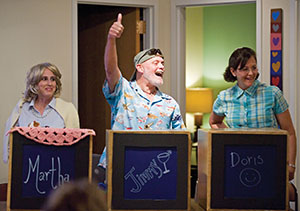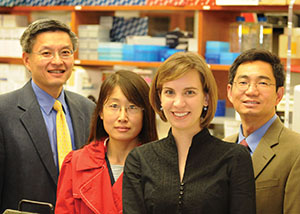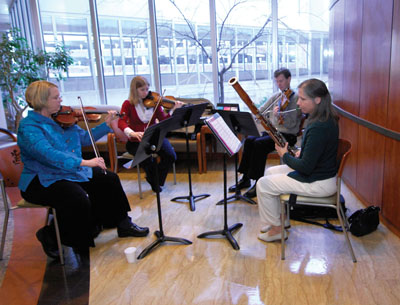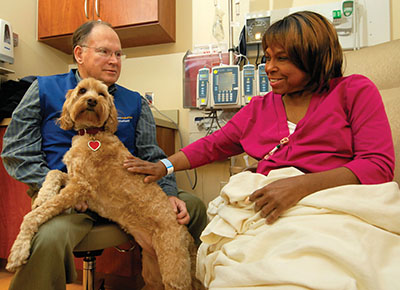Quick Takes
News from around the Cancer Center
June 17, 2010
Busting myths about cancer clinical trials
Using elements of “Jeopardy,” “Saturday Night Live” and the Discovery Channel show “MythBusters,” Vanderbilt cancer survivors and researchers have developed an entertaining program to skewer myths about cancer clinical trials.

A panel of faux celebrities participate in “Mythbusters: Cancer Research in Jeopardy” at a Gilda’s Club Nashville event in october 2009. (From left) Caroline Hanson (as Martha Stewart), Gary Piper (as Jimmy Buffet) and Pam Martin (as Doris Gump). (Photo by Joe Howell)
The educational project, “Mythbusters: Cancer Research in Jeopardy,” was presented recently by Vanderbilt-Ingram Cancer Center Research Advocates and members of the Vanderbilt Postdoctoral Association.
Patient Research Advocate Patty Lee (as “Alexandra Trebek”) presented 10 common myths about cancer research and clinical trials and encouraged nearly 50 audience participants to vote on possible answers electronically. Videotaped answers from Vanderbilt cancer experts were used to debunk the myths and provide factual information about cancer clinical trials available to patients today.
“The goal of this interactive program is to dispel misconceptions associated with cancer research and provide educational material in a relaxed and entertaining environment,” said Jane Kennedy, manager of Patient Advocacy, who spearheaded the development of the program.
The educational project was also highlighted at this year’s American Association of Cancer Research 101st Annual Meeting.
– Dagny Stuart
Cancer Center investigators land Stand Up to Cancer grant
William Pao, M.D., Ph.D., associate professor of Medicine, has been awarded a grant from Stand Up to Cancer (SU2C) to identify molecules that could speed the search for new cancer drugs and targets.
He is one of 13 young cancer investigators to earn a grant from SU2C. Over a three-year period, each investigator will receive up to $750,000 from SU2C’s Innovative Research Grants program, which supports the next generation of cancer researchers.

William Pao, M.D., Ph.D., left, with colleagues, from left, Peilin Jia, Ph.D., Juliann Chmielecki and Zhongming Zhao, Ph.D. (Photo by Mary Donaldson)
Pao and his colleagues are studying kinases, molecules inside cells involved in telling a cell whether to proliferate. In cancers, these kinases can become aberrant so that they are stuck in the “on” position, telling cells to divide all the time.
“Mutant kinases are very druggable targets, so if you identify the right drug to turn off a specific mutant kinase in cancer, you can kill the tumor,” said Pao, Ingram Associate Professor of Cancer Research and director of Personalized Cancer Medicine.
The best example of this is in chronic myelogenous leukemia (CML), caused by an abnormal fusion of the kinase ABL with another protein (BCR). The discovery of that kinase fusion led to the drug Gleevec, which revolutionized treatment for CML.
Pao and graduate student Juliann Chmielecki have found a way to speed up the search for fusions involving any of the 90 tyrosine kinases in the human genome, using minimal amounts of starting tumor material.
The team – which includes Zhongming Zhao, Ph.D., associate professor in Biomedical Informatics, and Peilin Jia, Ph.D., research fellow in Biomedical Informatics – is now ready to start screening tumors for novel fusions.
Pao said this focus on genetic profiling of tumors will lead to improvements in personalized medicine.
“Many drug companies are developing kinase inhibitors, so there may already be a drug in development that would target a fusion that we find,” said Pao. “We could then prioritize patients who should receive that drug, based on the genetic profile of their tumor.”
This is the Cancer Center’s second SU2C grant. Earlier this year, Carlos Arteaga, M.D., director of the Vanderbilt-Ingram Breast Cancer Program, and Patty Lee, Patient Research Advocate, were chosen to participate in one of the SU2C Cancer Dream Teams studying breast cancer.
– by Dagny Stuart
Nashville Symphony brings soothing sounds to Vanderbilt-Ingram
The rich sounds of violins and other stringed instruments are resonating through the halls of the Vanderbilt-Ingram Cancer Center.
After months of planning, Nashville Symphony members are volunteering their time to bring orchestral music to cancer patients and their families.
“The Symphony approached Vanderbilt-Ingram Cancer Center because our music is ultimately about serving our communities and those with the most need,” said Mitchell Korn, the symphony’s vice president for education and community engagement.

A quartet from the Nashville Symphony (from left, Deidre Bacco, Anna Lisa Hoepfinger, Dan Reinker and Dawn Hartley) performed in the Chemotherapy Infusion Clinic and outside the Cancer Clinic reception lobby during the holidays. (Photo by Anne Rayner)
“Our musicians are dedicated to providing music in all kinds of settings, and here we are given the privilege to create music and beauty for those who are amidst real struggle.”
Musicians who offer to play at Vanderbilt University Medical Center must go through the same training required for all hospital volunteers.
“We wanted to bring another form of music to our patients, so we set up a special training session to accommodate the complicated schedules of these musicians,” said Kim Hunter, program coordinator of Patient and Family Support Services for Vanderbilt-Ingram.
Fifteen members of the Nashville Symphony have already been trained as volunteers, and small groups of the musicians will be playing in parts of the Cancer Clinic as their schedules allow.
Some of the musicians have a personal reason for volunteering. The Schermerhorn Symphony Center in downtown Nashville was named in honor of the late Maestro Kenneth Schermerhorn, who led the Grammy Award-winning Nashville Symphony for 22 years. He died of non-Hodgkin’s lymphoma in 2005.
“This place means a lot to us because our former music director was here,” said Deidre Bacco, one of the first violinists.
“When I think of Vanderbilt-Ingram, I think of Maestro (Kenneth) Schermerhorn, and it is a way to give back to his memory.”
– by Dagny Stuart
Friedman to lead Pediatric Hematology/Oncology
Debra Friedman, M.D., was recently named the director of the Division of Pediatric Hematology/Oncology at Vanderbilt University following an extensive national search.

Debra Friedman, M.D.
Friedman, associate professor of Pediatrics and the E. Bronson Ingram Chair in Pediatric Oncology, served as interim director since July 2009.
Friedman is the leader of the Cancer Control and Prevention Program at the Vanderbilt-Ingram Cancer Center and director of the REACH for Survivorship Program, a collaborative venture between the Department of Pediatrics, the Monroe Carell Jr. Children’s Hospital at Vanderbilt and the Cancer Center.
“Our programs in pediatric cancer are our highest priority, and I am truly delighted with this choice,” said Jonathan Gitlin, M.D., assistant vice chancellor for Maternal and Child Health and chair of the Department of Pediatrics. “Deb Friedman is an extraordinary individual who will lead the division with compassion and creativity.”
Friedman came to Vanderbilt in 2008 from Seattle, where she was director of the LiveStrong Survivorship Center of Excellence at the Fred Hutchinson Cancer Research Center and director of the Cancer Survivorship Program at Children’s Hospital and Regional Medical Center.
“Having a world-renowned expert such as Dr. Friedman as both a leader of our cancer control and survivorship research as well as director of clinical care and research in pediatric hematology/oncology, assures a collaborative and integrated approach that is critical as we move forward,” said Jennifer Pietenpol, Ph.D., director of the Cancer Center.
“It is an incredible honor,” Friedman said. “I am so fortunate to work with an exceptionally dedicated and talented faculty and staff. I look forward to working with all of them to advance our clinical and research enterprise to improve the lives of children and their families living with, through and after cancer.”
– by Jessica Ennis
New pet visitor team has strong Vanderbilt roots
Vanderbilt-Ingram Cancer Center’s newest pet visitor team – a miniature Australian labradoodle named Maddie and her human friend, Allan Bass Jr. – is bringing smiles to the faces of cancer patients and families.
“My wife’s priorities for a dog were simple: no shedding and a relatively small size,” said Bass. “My priority was a Labrador retriever.”

Patient Patricia Hollins spends a little quality time with Vanderbilt-Ingram Cancer Center’s newest pet visitor team, Allan Bass Jr. and ‘Maddie.’ (Photo by Anne Rayner)
So the Nashville couple settled on a puppy with a mixture of poodle and Labrador traits –evident in Maddie’s silky-soft fur and happy demeanor.
When Bass decided he should share Maddie’s loving disposition with others, he immediately thought of Vanderbilt University Medical Center.
His wife’s breast cancer was treated by physicians at Vanderbilt-Ingram. His father, Allan D. Bass, M.D., now deceased, was chair of the Department of Pharmacology for two decades and served as acting dean for Biomedical Sciences during 1973-74. And Bass’ mother, Sara, was a graduate of the Vanderbilt University School of Nursing.
“My parents molded me and taught me to do things for others,” said Bass. “They told me that only about 10 percent of people make the world go around.”
So he has focused on being one of the 10 percent who make a difference, and he decided Maddie could help.
He and Maddie enrolled in a Delta Society-sponsored pet partners program, which trains human-animal teams for visiting animal programs in hospitals, nursing homes and schools. Every pet visitor team at Vanderbilt must undergo this rigorous training, and Bass and Maddie received theirs through Nashville-based Therapy ARC.
With their Delta Society certification under their collars, the duo started visiting nursing homes and recently added Vanderbilt-Ingram to their circuit.
Whether it’s Maddie’s beautiful brown eyes, Bass’ soothing voice, or some combination of the two, the new team is already winning friends among the Cancer Center’s staff and patients.
– by Dagny Stuart
Lung cancer trial goes online for ‘never smokers’
A new study is harnessing the power of the Web to help search for genetic differences that may help explain why some “never smokers” develop lung cancer.
More than 219,000 people are diagnosed with lung cancer in the United States every year, according to the National Cancer Institute. About 20,000 – one in 10 – never smoked, and most are women.
“Our goal is to look at the DNA in blood or saliva samples as part of a future genome-wide association study,” said William Pao, M.D., Ph.D., director of Personalized Cancer Medicine at Vanderbilt-Ingram Cancer Center, and lead investigator on the study.
Pao and colleagues hope to collect 2,000 DNA specimens from never smokers (individuals who have smoked fewer than 100 cigarettes in their lifetime). Since a single cancer center sees so few of these types of patients each year, Pao turned to the Web to recruit patients.
Patients fill out a Web-based questionnaire and, if they qualify, are sent two empty blood vials. The vials can be filled at their next doctor’s visit and shipped to Vanderbilt via UPS (postage paid). Those who can’t get blood drawn may provide saliva samples. To protect patient privacy and to prevent tracing samples back to a specific donor, the DNA samples are de-identified.
According to the American Cancer Society, fewer than 20 percent of lung cancer patients are still alive five years after diagnosis.
“More than half of all lung cancer patients are diagnosed in the incurable stage, so we’re already on the losing side of the battle with too many patients by the time we detect the cancer,” explained Pao, who is also an Ingram Associate Professor of Cancer Research.
“Eventually, this kind of study may help us identify genetic targets that allow us to develop simple blood tests to detect cancer early. Those same targets could be used to develop drugs that block or interfere with the disease process.”
– by Dagny Stuart
Cancer Center team grows
The Vanderbilt-Ingram Cancer Center team of researchers, physician-scientists and clinicians continues to grow. Faculty who joined Vanderbilt-Ingram in 2009 include:
Vandana Abramson, M.D. – breast oncology
Dana Backlund, M.D. – gastrointestinal oncology
James Broome, M.D. – endocrine surgery
Scott Borinstein, M.D. – pediatric oncology
Dai Chung, M.D. – pediatric surgery
Sandra Deming, Ph.D., M.P.H. – epidemiology
Stephen Fesik, Ph.D. – leading Cancer Drug Discovery
David Gius, M.D., Ph.D. – radiation oncology
Leora Horn, M.D. – thoracic oncology
Mia Levy, M.D. – chief medical informatics officer
Eric Liu, M.D. – surgical oncology
Kevin Palka, M.D. – neuro-oncology
William Pao, M.D., Ph.D. – leading Personalized Cancer Medicine Initiative
David Penson, M.D., M.P.H. – urologic surgery
Otis Rickman, D.O. – pulmonology
Allen Sills, M.D. – neurological surgery
Stephen Smith, M.D. – oncology, Cool Springs practice
William Tansey, Ph.D. – co-leading the Genome Maintenance Program
Zhongming Zhao, Ph.D. – chief bioinformatics officer
New call center streamlines access for Cancer Center patients
The Vanderbilt-Ingram Cancer Center has created a new call center designed to streamline access for both patients and referring providers, including local (Davidson County) and toll-free numbers.
- Patients seeking an appointment or needing to reach the cancer clinics: 936-VICC (936-8422) or 877-936-VICC (877-936-8422)
- Referring clinicians seeking to make a referral or schedule a consultation: 343-3700 or 877-6MD-VICC (877-663-8422)
- Both patients and referring clinicians seeking additional information or access to a cancer clinical trial: 936-5847 or 800-811-8480
